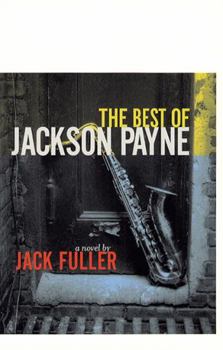The Best of Jackson Payne
Select Format
Select Condition 
Book Overview
When Charles Quinlan, an academic obsessed with jazz, starts exploring the life and death of Jackson Payne, a fictional tenor-sax player, he can't imagine where his research will lead. Told in a series of dazzling riffs by everyone from Payne's lovers to his fellow musicians, The Best of Jackson Payne is a novel that swings unlike any other.
Format:Paperback
Language:English
ISBN:0226268683
ISBN13:9780226268682
Release Date:September 2001
Publisher:University of Chicago Press
Length:321 Pages
Weight:0.60 lbs.
Dimensions:0.7" x 5.5" x 8.5"
Customer Reviews
1 rating
Writing Jazz
Published by Thriftbooks.com User , 23 years ago
Fuller's "The Best of Jackson Payne" is an ambitious novel. Were it concerned with a man's life and especially a jazz life, it would be interesting. The fact that Fuller tackles some harder questions of philosophy in a fluent literary wrapper, makes the book remarkable, and a remarkable achievement. Some of these questions include: How can we know another person? Is "truth" a composite? What explains great art?, and the great question of aesthetics -- is the life of an artist relevant to an understanding of his art? Slowing down to wrap the reader in the reality of these issues, never so bluntly posed, Fuller brings to life Jackson Payne, a composite rendering of a saxophonist, and full-featured, full-blooded man in the world. We find in Payne a Faustian character at once difficult and sublime, no matter where or when we find him. He is a hero in Korea, later deep in heroin addiction, in prison, performing at the top of the jazz world, betraying some, loyal to others, complex, conflicted, modern, an enigma to himself. A Bronze Star, "that should have been Silver," seems a small reward for the wounds that Payne takes from Korea. If jazz is the symbol of Payne's existence, so is Korea. The hard side of Payne -- Korea, junk, prison, his murder or assisted suicide, always stand in balance to his achievement in art -- some great records, some good relationships, some great performances, a cult around him as a supremely gifted experimentalist. Jazz fans will puzzle more over who served as the model for Payne than the manner of his death, which Fuller builds to full-blown mystery status by the final pages. Certainly Payne is drawn from several jazzmen's biographies, and to have made him anything other would have denied Fuller the opportunity to explore generally the jazz life, especially that of the 1945-75 era of which he writes. It is hard to escape the belief that nonetheless the author had someone in mind, just as love songs are said to be about a particular person. Clues are scattered throughout the text, for example, Payne has a low point where he opens for some sixties rock groups - music "so bad that it shouldn't even be heard through a wall." Sounds like Archie Shepp, or Pharoah Sanders, just as earlier passages suggest Dexter Gordon, Coleman Hawkins, or Sonny Rollins. But there are just too many other clues --- an R & B background, mastery of every playable scale, rhythm, syncopation, extended solos (some lovely, some excruciating) the reach to the sublime spiritual level, and a wife a lot like Alice -- to make it that hard to hazard a guess. If Jackson Payne isn't mostly John Coltrane, his music has got to be the closest suspect. For jazz followers this is satisfying to a great degree. Fuller allows Payne to live another 10 years beyond the life of Coltrane, and projects what direction his music might have taken. In Payne he hints, toward the sweeter, certain of its roots, self-referential but not arcane, with a profound human





